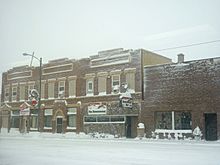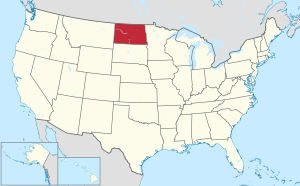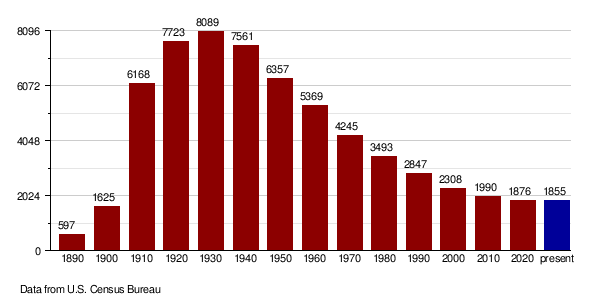Logan County, North Dakota facts for kids
Quick facts for kids
Logan County
|
|
|---|---|

Winter view of downtown Napoleon, North Dakota.
|
|

Location within the U.S. state of North Dakota
|
|
 North Dakota's location within the U.S. |
|
| Country | |
| State | |
| Founded | January 4, 1873 (created) September 1, 1884 (organized) |
| Named for | John A. Logan |
| Seat | Napoleon |
| Largest city | Napoleon |
| Area | |
| • Total | 1,011 sq mi (2,620 km2) |
| • Land | 993 sq mi (2,570 km2) |
| • Water | 18 sq mi (50 km2) 1.8% |
| Population
(2020)
|
|
| • Total | 1,876 |
| • Estimate
(2022)
|
1,855 |
| • Density | 1.8556/sq mi (0.7164/km2) |
| Time zone | UTC−6 (Central) |
| • Summer (DST) | UTC−5 (CDT) |
| Congressional district | At-large |
Logan County is a county in the U.S. state of North Dakota. As of the 2020 census, the population was 1,876. Its county seat is Napoleon.
Contents
History
The Dakota Territory legislature created the county on January 4, 1873. It was named for John A. Logan (1826-1886), a Civil War general and United States Senator from Illinois. The county government was not organized at that time, but the county was not attached to another county for administrative or judicial purposes. The county government organization was effected on September 1, 1884.
The county's boundaries were altered in 1883. They have remained in the present configuration since that time. Napoleon was the county seat from 1884 to 1899. King became the county seat briefly in 1899 before Napoleon once again was given that title.
Geography
The Logan County terrain consists of rolling hills, dotted with lakes and ponds. The area is largely devoted to agriculture. The terrain slopes to the east, with its highest point near its southwestern corner at 2,133 ft (650 m) ASL. The county has a total area of 1,011 square miles (2,620 km2), of which 933 square miles (2,420 km2) is land and 1.8 square miles (4.7 km2) (2.0%) is water.
Major highways
Adjacent counties
- Stutsman County - northeast
- LaMoure County - east
- McIntosh County - south
- Emmons County - west
- Kidder County - northwest
Protected areas
Source:
- Arnies Lake
- Beaver Lake
- Doyles Lake
- Fish Lake (part)
- Island Lake
- McKenna Lake
- Red Lake
- Round Lake
Protected areas
- Beaver Lake State Park
Demographics
| Historical population | |||
|---|---|---|---|
| Census | Pop. | %± | |
| 1890 | 597 | — | |
| 1900 | 1,625 | 172.2% | |
| 1910 | 6,168 | 279.6% | |
| 1920 | 7,723 | 25.2% | |
| 1930 | 8,089 | 4.7% | |
| 1940 | 7,561 | −6.5% | |
| 1950 | 6,357 | −15.9% | |
| 1960 | 5,369 | −15.5% | |
| 1970 | 4,245 | −20.9% | |
| 1980 | 3,493 | −17.7% | |
| 1990 | 2,847 | −18.5% | |
| 2000 | 2,308 | −18.9% | |
| 2010 | 1,990 | −13.8% | |
| 2020 | 1,876 | −5.7% | |
| 2022 (est.) | 1,855 | −6.8% | |
| U.S. Decennial Census 1790-1960 1900-1990 1990-2000 2010-2020 |
|||
2020 census
As of the census of 2020, there were 1,876 people.
2010 census
As of the census of 2010, there were 1,990 people, 843 households, and 562 families in the county. The population density was 2.0 inhabitants per square mile (0.77/km2). There were 1,144 housing units at an average density of 1.2 per square mile (0.46/km2). The racial makeup of the county was 98.4% white, 0.5% American Indian, 0.3% Asian, 0.1% black or African American, 0.1% from other races, and 0.7% from two or more races. Those of Hispanic or Latino origin made up 0.6% of the population. In terms of ancestry, 76.0% were German, 16.2% were Russian, 9.9% were Norwegian, and 6.3% were American. The county has the highest share of Russian-Americans out of any county in the United States.
Of the 843 households, 21.8% had children under the age of 18 living with them, 61.4% were married couples living together, 3.0% had a female householder with no husband present, 33.3% were non-families, and 30.8% of all households were made up of individuals. The average household size was 2.28 and the average family size was 2.84. The median age was 49.8 years.
The median income for a household in the county was $41,741 and the median income for a family was $52,262. Males had a median income of $34,451 versus $22,284 for females. The per capita income for the county was $21,654. About 8.3% of families and 10.9% of the population were below the poverty line, including 7.5% of those under age 18 and 18.9% of those age 65 or over.
Population by decade

Communities
Cities
- Fredonia
- Gackle
- Lehr (partly in McIntosh County)
- Napoleon (county seat)
Unincorporated communities
- Burnstad
- Guyson
Townships
- Finn
- Glendale
- Gutschmidt
- Haag
- Janke
- Red Lake
- Sealy
Unorganized territories
- East Logan
- West Logan
Defunct townships
- Bryant (now in West Logan UT)
- Dixon (now in West Logan UT)
- Kroeber
- Starkey (now in West Logan UT)
See also
 In Spanish: Condado de Logan (Dakota del Norte) para niños
In Spanish: Condado de Logan (Dakota del Norte) para niños

